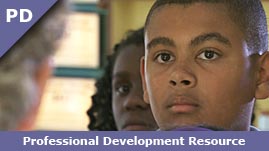Teachers' Domain - Digital Media for the Classroom and Professional Development
User: Preview

Source: ITEST Learning Resource Center


Collection developed in collaboration with the Educational Development Center's ITEST Learning Resource Center (LRC).

This Michigan State University/Lansing Boys and Girls Club partnership demonstrates the powerful result of giving youth the science background and tools they need to carry out investigations of their own design, and to communicate their knowledge in their own voice.
GET City, a collaboration between Michigan State University and Lansing Boys and Girls Club, is a youth-based program designed to empower inner-city youth to become community science experts in energy sustainability and environmental health topics. The year round after-school program integrates hands-on, experiential learning with training in Information Technologies (IT) tools of communication, all within the context of the students’ own cultural knowledge and experiences. Program participants gain IT workforce skills, research experience, science knowledge, and inquiry skills, and use these to effectively communicate their concerns and ideas to their peers and to community leaders.
A key program objective, portrayed in this video profile, is to develop ways to give socio-economically disadvantaged kids authority over the path and products of their learning. GET City’s inquiry-based approach begins with community stakeholders who offer expertise and background knowledge. Then the program responds flexibly to provide students with the tools they need to carry out investigations of their own design. For example, students design and execute a survey of their community’s conservation practices, collect data on the urban heat island phenomenon, and investigate environmental health impacts of climate change. Each investigation culminates with students finding a way to express their ideas in their own authentic voice, utilizing a range of IT tools: PSAs and mini-documentaries, a Web site and newsletter, or PowerPoint presentation.
• Can your project leverage community stakeholders (such as conservation organizations, schools of education, or local government) to provide training, expertise or participation in existing field investigations?
• What are issues of local concern to your area’s youth? Can students design their own investigations, gather real world data, and present results to vested “clients” in the community?
• How can your project provide a social network that supports youth in acting and thinking like scientists while supporting them in gaining the social and cultural capital that help them to exist in their worlds?
 Loading Standards
Loading Standards Teachers' Domain is proud to be a Pathways portal to the National Science Digital Library.
Teachers' Domain is proud to be a Pathways portal to the National Science Digital Library.
